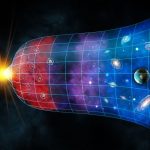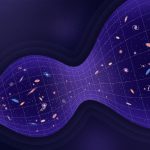Key Takeaways:
- New research suggests that the universe may be constantly evolving and adapting its physical laws to achieve stability.
- The paper, authored by researchers from Microsoft and Brown University, proposes applying Darwinian natural selection to cosmology.
- Over time, simpler physical laws of the universe may have evolved into more sophisticated ones.
- This concept challenges the idea that the laws of physics are fixed and immutable.
- The research explores the possibility of a higher-order universal law that transcends scientific fields.
An intriguing new study published on the pre-print server arXiV suggests that the universe might be a self-taught autodidact, continuously refining its understanding of physics to achieve stability.
While we often associate self-taught individuals with human feats, this research proposes a similar phenomenon occurring on a cosmic scale. Authored by a team of scientists from Microsoft and Brown University, this study delves into the idea that the laws of physics we observe today have evolved over time through a process akin to Darwinian natural selection applied to cosmology.
To grasp this concept, consider the universe as a learner seeking equilibrium. Initially, it relied on simpler physical laws, which gradually became more sophisticated as it sought stability. Just as certain species adapt to their environments and pass on advantageous traits, the universe adapted its physical laws to persist. This perspective challenges the conventional belief that the laws of physics are unchanging constants.
Imagine an early universe where basic concepts like gravitational attraction were less refined. In this scenario, Newton’s law of gravitation might not have held true, potentially leading to different cosmic phenomena. This principle extends to all known laws of physics. As the universe evolves, it teaches itself, and fundamental laws emerge, mirroring the way self-learning systems develop new rules in artificial intelligence.
This study unites cosmology and biology, proposing a universal mechanism woven into the fabric of the natural world that enables the universe to learn its own laws. Such a transcendent law could govern all scientific fields, including physics and biology, challenging our understanding of the universe’s fundamental principles.
The paper emphasizes the importance of exploring connections between different fields of knowledge, as our compartmentalized approach may lead us to overlook universal truths. While the concept of a self-teaching universe may be challenging to grasp with our current scientific paradigms, it invites us to consider the possibility that the universe operates by rules beyond our comprehension.
In the words of renowned cosmologist Neil deGrasse Tyson, “The universe is under no obligation to make sense to us.” Unlike humans, the universe operates without competition or consciousness. While the research remains speculative, it encourages us to take the first steps toward a new theory that could revolutionize our understanding of the cosmos.
In the realm of theoretical physics, where radical ideas are essential, this study provides an intriguing invitation to explore the mysteries of our enigmatic universe. It may not immediately lead to groundbreaking discoveries, but it has the potential to inspire a paradigm shift in our understanding of the universe—one that even the authors could not have imagined.


